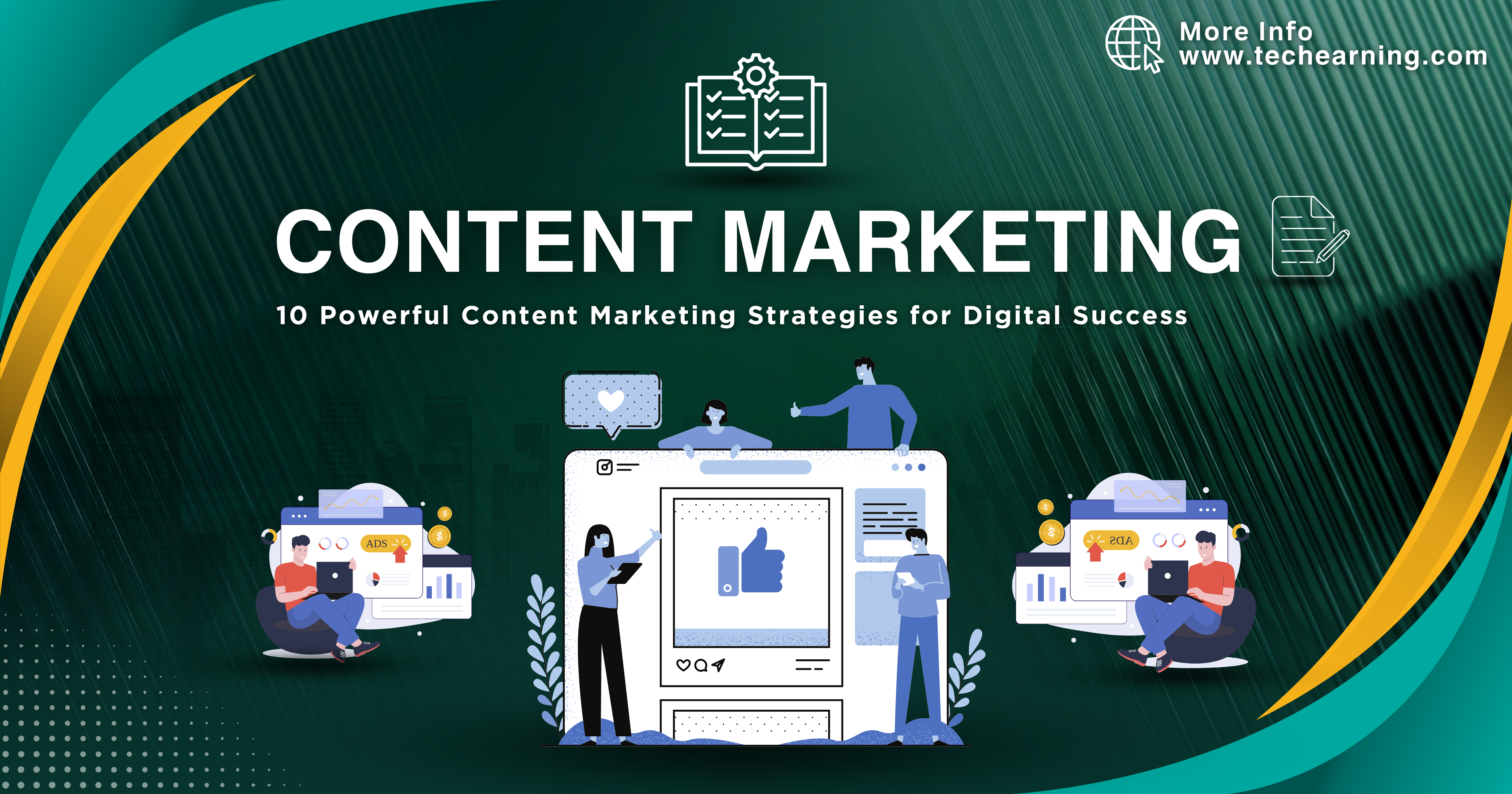
10 Powerful Content Marketing Strategies for Digital Success
What is Content Marketing ?
Content Marketing is a technique where valuable, relevant, and consistent content is created to attract and engage a specific audience. This strategy differs from traditional marketing because it provides valuable information that solves audience problems instead of just promoting products or services.
Why is Content Marketing Important ?
In today’s digital world, customers prefer brands that offer useful information rather than just advertising. Content Marketing allows businesses to connect with their audience, build trust, and establish themselves as industry leaders. With the right strategy, businesses can achieve long-term success.
Benefits of Content Marketing
Content Marketing offers several advantages for any business. Let’s explore these benefits with numbers:
- Increases Brand Awareness – Regular publication of valuable content helps people recognize your brand.
- Improves SEO Ranking – Quality content helps improve search engine rankings, making it easier for people to find your business online.
- Enhances Audience Engagement – High-quality content keeps users engaged, increasing lead generation and conversions.
- Builds Trust and Credibility – Informative and genuine content establishes your brand as an authority in your industry.
- Boosts Lead Generation and Sales – Through Content Marketing, potential customers learn about your products and services, increasing lead conversion rates.
- Cost-Effective Strategy – Compared to traditional marketing methods, Content Marketing is a more affordable and long-term profitable strategy.
- Supports Other Marketing Strategies – Content can be repurposed for email campaigns, social media, and paid ads.
- Encourages Customer Loyalty – Regularly providing valuable content ensures customers return to your business.
- Drives Long-Term Results – Unlike paid ads, well-optimized content continues to bring traffic and leads over time.
- Improves Social Media Presence – Engaging content encourages shares, likes, and comments, enhancing your brand’s visibility.
Best Practices for Content Marketing
If you want to create a successful Content Marketing strategy, follow these best practices:
Understand Your Target Audience
First, it is essential to understand who your content is for. Analyze your audience’s interests, pain points, and behavior to create personalized content.
Conduct Keyword Research
SEO optimization is possible only when you conduct proper keyword research. Use “Content Marketing” and related keywords appropriately to improve search visibility.
Create High-Quality and Valuable Content
Your content should be informative, engaging, and unique. Focus on solving audience problems rather than just promoting products.
Maintain Consistency
Regularly publishing content is crucial to keep the audience engaged and improve search engine rankings. A content calendar can help plan and organize content effectively.
Focus on Content Distribution
Content should not be limited to creation; proper promotion is also essential. Use multiple channels like social media, email marketing, and guest posting to reach a wider audience.
Include a Call-to-Action (CTA)
If you want readers to take specific actions, include a CTA like “Subscribe,” “Contact Us,” or “Download Now.” This helps drive conversions and lead generation.
Analyze Content Performance
Use tools like Google Analytics and Rank Math to track how your content is performing. Monitor metrics like page views, bounce rate, and engagement time to improve future content strategies.
Types of Content Marketing
Content Marketing includes various types that can be used based on business goals:
- Blogging – Best method for SEO and organic traffic. Helps establish brand authority.
- Video Content – Great for platforms like YouTube and Instagram Reels. Engages users with visual storytelling.
- Infographics – Simplifies complex topics through visual representation, making information easy to digest.
- Social Media Posts – Increases audience engagement on platforms like Facebook, LinkedIn, and Twitter.
- E-books & Whitepapers – Best format for sharing in-depth knowledge and lead generation.
- Podcasts – Effective way to engage the audience through audio content, offering convenience for listeners.
- Case Studies – Real-life examples showcase how your product or service has helped customers achieve success.
- Webinars and Live Events – Engages audience in real-time and builds stronger relationships with potential customers.
- User-Generated Content – Encourages customers to share their experiences and testimonials, increasing credibility.
- Email Newsletters – Keeps your audience updated with valuable insights, promotions, and industry trends.
Common Mistakes in Content Marketing
- Not Understanding the Target Audience – Creating content without audience insights leads to poor engagement.
- Ignoring SEO Optimization – Without proper SEO, content will struggle to rank and reach potential customers.
- Inconsistent Content Publishing – Posting irregularly can lead to reduced audience engagement and visibility.
- Not Promoting the Content – Great content needs distribution through social media, email marketing, and collaborations.
- Failing to Analyze Performance – Not measuring content success prevents necessary improvements and optimizations.
- Focusing Only on Sales-Oriented Content – Content should provide value, not just promote products.
- Ignoring Different Content Formats – Using only one type of content limits engagement potential.
- Not Updating Old Content – Refreshing and repurposing older content helps maintain relevance.
How to Measure Content Marketing Success ?
To measure the effectiveness of your Content Marketing strategy, track key metrics:
- Website Traffic – How many people visit your content?
- Engagement Metrics – Analyze bounce rate, average session duration, and pages per session.
- Lead Generation – How many leads are generated through your content?
- Conversion Rate – How many users take action on your CTA?
- SEO Ranking – Where do your targeted keywords rank?
- Social Shares & Comments – Indicates content popularity and audience interaction.
- Email Open & Click Rates – Helps measure the effectiveness of newsletters and email campaigns.
- Customer Retention – Tracks repeat visitors and loyal customers.
Conclusion
Content Marketing is a powerful tool that can boost a business’s online presence and brand value. If implemented correctly, it will improve your website ranking, increase audience engagement, and ultimately grow your sales. By focusing on high-quality content, proper promotion, and continuous optimization, businesses can drive long-term success.
Want to explore more insightful content on digital marketing? Check out our Home Page for the latest updates and expert tips!